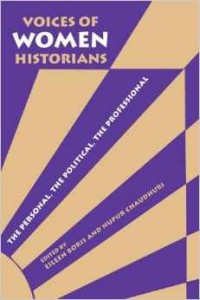45th Anniversary
The CCWH celebrated 45 years in 2015!
During the past forty-five years women historians have achieved significant gains. They range from the percentage of women receiving Ph.D. in history rising from 11% in 1969 to 42% in 2008 [1] to the growing prominence of women historians  as presidents of the AHA and the Organization of American Historians.
as presidents of the AHA and the Organization of American Historians.
Voices of Women Historians, published in 1999 to celebrate the thirtieth anniversary of the CCWH, charts the professional, political and personal lives of prominent members such as Gerda Lerner, Bernice Carroll, Hilda Smith, Linda Kerber, Renate Bridenthal and Mary Elizabeth Perry who have served as presidents of CCWH and some of the AHA.[2]
Besides its work within the United States, the CCWH has made substantial efforts to include historians who research and teach the histories of the so-called Other meaning Africa, Asia, Latin America and the Middle East. For example, the CCWH cooperates with the Society for the Advancement of the History of South Asia and more broadly is the US representative to the International Federation for Research in Women’s History (IFRWH).
To recognize and support the research of historians of women the CCWH established several awards. The Joan Kelly Memorial Prize in Women’s History is for the best work in women’s history or feminist theory. The Catherine Prelinger Award endows the research of a scholar who has followed a non-traditional, academic path. The CCWH-Berkshire Fellowship and the Ida B. Wells Fellowship help doctoral students to complete their dissertations. The Nupur Chaudhuri First Article Prize is for an article that a CCWH member publishes in a referred journal.
The most important function and benefit for members of the CCWH is providing opportunities for networking and mentoring women’s historians and historians of women. This work proceeds within and beyond existing institutions. The CCWH helps to organize and co-sponsors panels for the annual meetings of the AHA and its affiliated societies, and other groups such as the World History Association. It co-sponsors a reception for graduate students at the AHA and for members and friends at other meetings such as the triennial Berkshire Conference on the History of Women. Its luncheon at the AHA showcases the work of a prominent woman historian and helps members network across age, regional, and subdisciplinary categories.
Although we appreciate our achievements, the officers of the CCWH realize that much remains to be done to secure and enhance the opportunities for women historians and historians of women. Experience and data reveal that the difficulties of balancing life responsibilities, especially childbearing and childrearing, with professional commitments continue to contribute to the departure of women from full time employment in academia (as in other professions). They also possibly account for the slower progress of women to the rank of professor. Our future program is to asset the life-work factors that impede women historians from achieving their full potential and to develop a “toolbox” for the mentoring of women historians from graduate education through the award of tenure to promotion to full professor. We welcome former and new members to join us in our efforts.
—–
[1] Robert B. Townsend, “What the Data Reveals about Women Historians,”Perspectives on History,” (May 2010), p. 14.
[2] Eileen Boris and Nupur Chaudhuri, eds. Voices of Women Historians: The Personal, The Professional, The Political (Bloomington: Indiana University Press, 1999), xiii
Preview, Google Books
Sandra Trudgen Dawson, Eileen Boris, Susan Wladaver-Morgan, Nupur Chaudhuri. Roundtable – Forty-Five Years of the CCWH: Then, Now, and the Future (AHA Session 212, January 2014)
April 22, 2014
Copyright © 2022 Coordinating Council for Women in History. All Rights Reserved.
Privacy Policy | Terms of Use | site credit